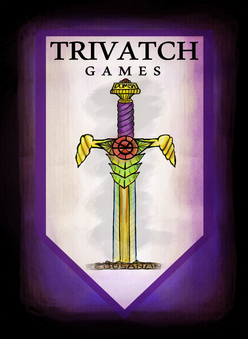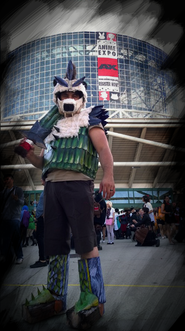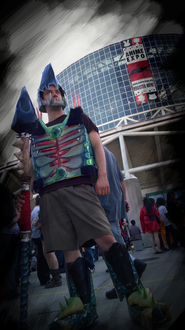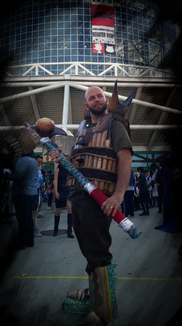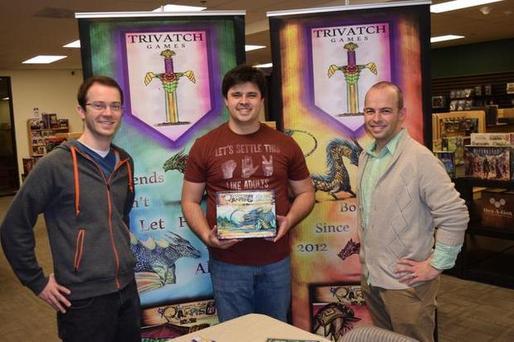Battling Boredom Since 2012
We love games and believe gaming is a positive force for good. Games provide opportunities for people to have fantastic adventures, solve problems, fail wildly, succeed without limits, compete, work together, laugh, build friendships, build communities, build worlds, and...of course...have lots of fun! Crafting these opportunities for the world is our passion.
We are curious inventors bent on coming up with new ways of gaming. We've been battling boredom together since birth, and as Trivatch since 2012. We are particularly interested in building bridges between different forms of gaming, between hardcore gamers and light gamers (everyone games in some form), and between reality and the virtual reality of games. Our number one goal is for people to feel a part of our creations, find friends in gaming, and have fun. |
A LIFELONG DREAM
|
By Rory Appleton
The Fresno Bee January 17, 2015 For Michael Vatcher, the decision to quit his job teaching
Chinese in Memphis, Tennessee, and move back to his hometown of Fresno
to finish his family designed board game was a tricky one.
“Ever since we’ve been married, my wife and I have moved around a lot — to the Bay Area, Taiwan and Memphis,” Michael said. “We finally decided look, we want to be back in Fresno. We both want to follow our dreams, and we will find a way to make that work.” |
In June, he and his family moved back home. With his wife, Michelle, supporting the family through her dream job as an event planner, Michael spent the last six months finishing the art for “Legends of Rakasa: Fordra,” a fantasy board game that he and his two younger brothers — Steven and David Vatcher — have worked on in their free time since 2012 under the name TriVatch.
“Legends of Rakasa” is a... card-based tabletop game where players assume the role of a villager looking to rise to the honored rank of hunter. These warriors protect the village from harm.
The core game is divided into five story-based chapters that chronicle the rise — or untimely death — of up to four players’ characters from lowly street urchin to hallowed warrior. Players battle a menagerie of creatures that range from dead roadkill to fearsome dragons and use the spoils from these battles to upgrade gear and satisfy their village’s chieftain.
“Legends of Rakasa” comes with a set of rules, but TriVatch encourages deviation from these laws. Each of the brothers actually play the game in a different way, and they’ve seen dozens of variations since they started hosting demonstrations at various game and Anime conventions throughout California.
“Michael and I wanted a certain type of board game, but we couldn’t find it anywhere,” David said. “Now that we have our own game, we don’t want to put the same limits on our players.”
Steven added that some of these player innovations even made their way into the latest version of the game. The TriVatch company website hosts a forum for players to share their different play styles. Players earn TriVatch points, which are used to purchase special Rakasa bonus cards for interacting online.
Although the idea to create a board game randomly struck David and Michael during a late-night online video game session, the decision to form TriVatch Games was not a new one.
“We always knew we wanted to form a company and call it TriVatch,” David said. “We decided as kids sharing a bedroom only meant for one kid — not three — in our 1,600-square-foot home near Shaw and Brawley [avenues]. The three of us always did everything together, especially playing games.”
David and Michael decided the fledgling company’s primary goal would be to create a board game that bridged the gap between tabletop gaming and video games. Their first game had to be structured and balanced enough to appeal to hardcore tabletop gamers, who are used to following instructions and using things like dice, cards, tiles and boards. But the duo knew the game also had to be open-ended enough to appeal to serious video game fans, like middle brother Steven.
With these lofty goals in hand, they set about creating a game from scratch through trial and error. Their first prototype, which relied on dozens of tiny blocks, proved too costly and ambitious for the first-time developers working from home. David and Michael scrapped this game in favor of a story-driven card game.
“Originally, our goal was just to make a game that interested our brother Steven, who was mainly into video games,” David said. “We knew that if he was interested, we were doing something right.”
After his brothers worked out the kinks with the first few “Legends of Rakasa” versions, Steven was swayed and joined the team. TriVatch was born, and the brothers set about delegating responsibilities.
“We wanted to build something that would incorporate all our skills, as well as interest others,” Michael said.
David took point on the business end of things. He was a business administration major in college and spends his days working as a human relations manager for Fresno Unified School District.
The youngest brother’s fascination with business started at 12 years old, when David began selling cherries on Fig Garden Drive.
“We had a cherry tree in our yard, and every year most of them would fall on the ground and go bad,” David said. “I just decided to sell them for a dollar a basket one year, and they went super quickly. I think I made about $200 that first year.”
“David made more money selling those cherries than I did at my part-time job in high school,” Michael added. “And it was only a seasonal business.”
David also spent countless hours designing each of “Legends of Rakasa’s” more than 1,000 game cards, which he said were designed individually using PowerPoint.
After an arrangement with an art student fell through, David and Michael planned to split the colorful art on each of the cards and the game’s box. That didn’t work out as planned.
“We all fell in love with art in William Clark’s 3-D design class at Bullard High,” David said. “He always told us ‘you can do art’ and ‘the world needs artists.’ Michael and I each drew a bottle for Rakasa to test our skills. I put my heart and soul into that bottle, but I knew the second Michael sent me his bottle that he would never let me do any of the art.”
Michael’s fascination with art persisted past Bullard High and into college, where he took art classes while pursuing his education in Chinese. “Legends of Rakasa’s” art was actually the reason Michael felt compelled to leave his chosen career and tackle the game full time.
“We knew it would take forever to finish Rakasa’s art with me working remotely during my free time,” Michael said. “The plan was originally to finish it all up in three months. It’s been over six [months], but we are finally about there.”
Michael also worked on the mathematical algorithms that help keep the board game fair and balanced for players.
Steven, who works as a waiter, said he’s always been interested in music and media. He designed the game’s trailer, works on its website and wrote Rakasa’s jaunty theme song.
The trio’s biggest obstacle is financing the distribution of the game. They use three different print-on-demand companies to print various parts of the game, which means every copy is produced and put together individually. The team only makes these copies after an online order. Only 11 copies are in public hands.
Michael is working on finding a distributor to mass-produce enough copies to sell them at conventions.
“People love our game,” Michael said. “They ask to buy it. But when we tell them to go online and order it — you can almost see the light in their eyes fade away.”
Michael also hopes to cut production costs enough to sell the game in local game shops, even if that means less profit. He credits Jennifer Ward, owner of Crazy Squirrel games on Bullard Avenue near Fresno Street, with helping TriVatch and other local gamers and designers realize their goals.
“We plan to be a supporting force in building the gaming community in Fresno, just as she [Ward] and her store are,” he says.
Although the current sales numbers are low, the three brothers are confident in their product.
“This is not a hobby,” David said. “This is a career move. We already have ideas for future games. This is something we hope to do full time one day.”
Read more here: http://www.fresnobee.com/2015/01/17/4334096_fresno-brothers-realize-lifelong.html?rh=1#storylink=cpy
“Legends of Rakasa” is a... card-based tabletop game where players assume the role of a villager looking to rise to the honored rank of hunter. These warriors protect the village from harm.
The core game is divided into five story-based chapters that chronicle the rise — or untimely death — of up to four players’ characters from lowly street urchin to hallowed warrior. Players battle a menagerie of creatures that range from dead roadkill to fearsome dragons and use the spoils from these battles to upgrade gear and satisfy their village’s chieftain.
“Legends of Rakasa” comes with a set of rules, but TriVatch encourages deviation from these laws. Each of the brothers actually play the game in a different way, and they’ve seen dozens of variations since they started hosting demonstrations at various game and Anime conventions throughout California.
“Michael and I wanted a certain type of board game, but we couldn’t find it anywhere,” David said. “Now that we have our own game, we don’t want to put the same limits on our players.”
Steven added that some of these player innovations even made their way into the latest version of the game. The TriVatch company website hosts a forum for players to share their different play styles. Players earn TriVatch points, which are used to purchase special Rakasa bonus cards for interacting online.
Although the idea to create a board game randomly struck David and Michael during a late-night online video game session, the decision to form TriVatch Games was not a new one.
“We always knew we wanted to form a company and call it TriVatch,” David said. “We decided as kids sharing a bedroom only meant for one kid — not three — in our 1,600-square-foot home near Shaw and Brawley [avenues]. The three of us always did everything together, especially playing games.”
David and Michael decided the fledgling company’s primary goal would be to create a board game that bridged the gap between tabletop gaming and video games. Their first game had to be structured and balanced enough to appeal to hardcore tabletop gamers, who are used to following instructions and using things like dice, cards, tiles and boards. But the duo knew the game also had to be open-ended enough to appeal to serious video game fans, like middle brother Steven.
With these lofty goals in hand, they set about creating a game from scratch through trial and error. Their first prototype, which relied on dozens of tiny blocks, proved too costly and ambitious for the first-time developers working from home. David and Michael scrapped this game in favor of a story-driven card game.
“Originally, our goal was just to make a game that interested our brother Steven, who was mainly into video games,” David said. “We knew that if he was interested, we were doing something right.”
After his brothers worked out the kinks with the first few “Legends of Rakasa” versions, Steven was swayed and joined the team. TriVatch was born, and the brothers set about delegating responsibilities.
“We wanted to build something that would incorporate all our skills, as well as interest others,” Michael said.
David took point on the business end of things. He was a business administration major in college and spends his days working as a human relations manager for Fresno Unified School District.
The youngest brother’s fascination with business started at 12 years old, when David began selling cherries on Fig Garden Drive.
“We had a cherry tree in our yard, and every year most of them would fall on the ground and go bad,” David said. “I just decided to sell them for a dollar a basket one year, and they went super quickly. I think I made about $200 that first year.”
“David made more money selling those cherries than I did at my part-time job in high school,” Michael added. “And it was only a seasonal business.”
David also spent countless hours designing each of “Legends of Rakasa’s” more than 1,000 game cards, which he said were designed individually using PowerPoint.
After an arrangement with an art student fell through, David and Michael planned to split the colorful art on each of the cards and the game’s box. That didn’t work out as planned.
“We all fell in love with art in William Clark’s 3-D design class at Bullard High,” David said. “He always told us ‘you can do art’ and ‘the world needs artists.’ Michael and I each drew a bottle for Rakasa to test our skills. I put my heart and soul into that bottle, but I knew the second Michael sent me his bottle that he would never let me do any of the art.”
Michael’s fascination with art persisted past Bullard High and into college, where he took art classes while pursuing his education in Chinese. “Legends of Rakasa’s” art was actually the reason Michael felt compelled to leave his chosen career and tackle the game full time.
“We knew it would take forever to finish Rakasa’s art with me working remotely during my free time,” Michael said. “The plan was originally to finish it all up in three months. It’s been over six [months], but we are finally about there.”
Michael also worked on the mathematical algorithms that help keep the board game fair and balanced for players.
Steven, who works as a waiter, said he’s always been interested in music and media. He designed the game’s trailer, works on its website and wrote Rakasa’s jaunty theme song.
The trio’s biggest obstacle is financing the distribution of the game. They use three different print-on-demand companies to print various parts of the game, which means every copy is produced and put together individually. The team only makes these copies after an online order. Only 11 copies are in public hands.
Michael is working on finding a distributor to mass-produce enough copies to sell them at conventions.
“People love our game,” Michael said. “They ask to buy it. But when we tell them to go online and order it — you can almost see the light in their eyes fade away.”
Michael also hopes to cut production costs enough to sell the game in local game shops, even if that means less profit. He credits Jennifer Ward, owner of Crazy Squirrel games on Bullard Avenue near Fresno Street, with helping TriVatch and other local gamers and designers realize their goals.
“We plan to be a supporting force in building the gaming community in Fresno, just as she [Ward] and her store are,” he says.
Although the current sales numbers are low, the three brothers are confident in their product.
“This is not a hobby,” David said. “This is a career move. We already have ideas for future games. This is something we hope to do full time one day.”
Read more here: http://www.fresnobee.com/2015/01/17/4334096_fresno-brothers-realize-lifelong.html?rh=1#storylink=cpy

